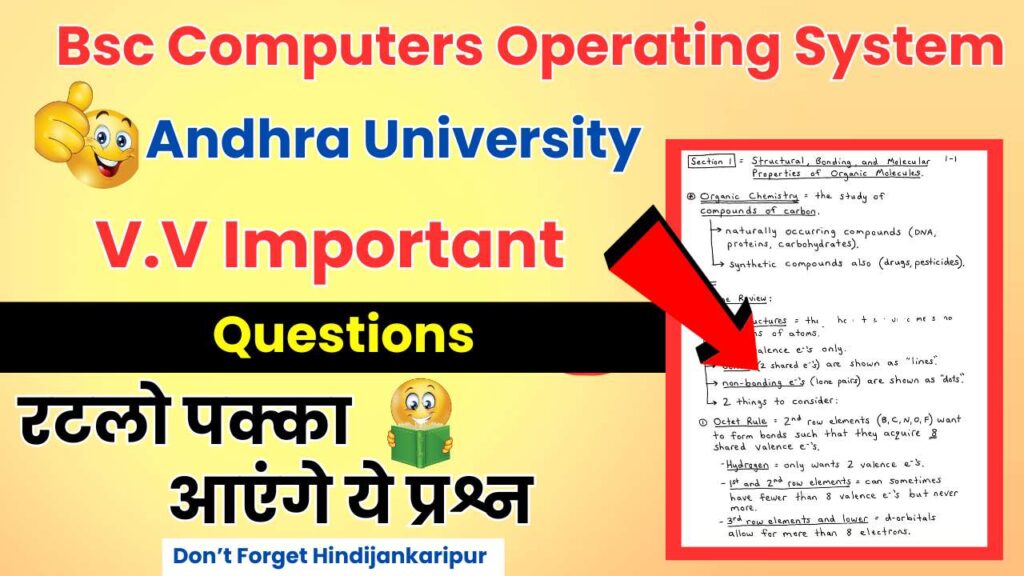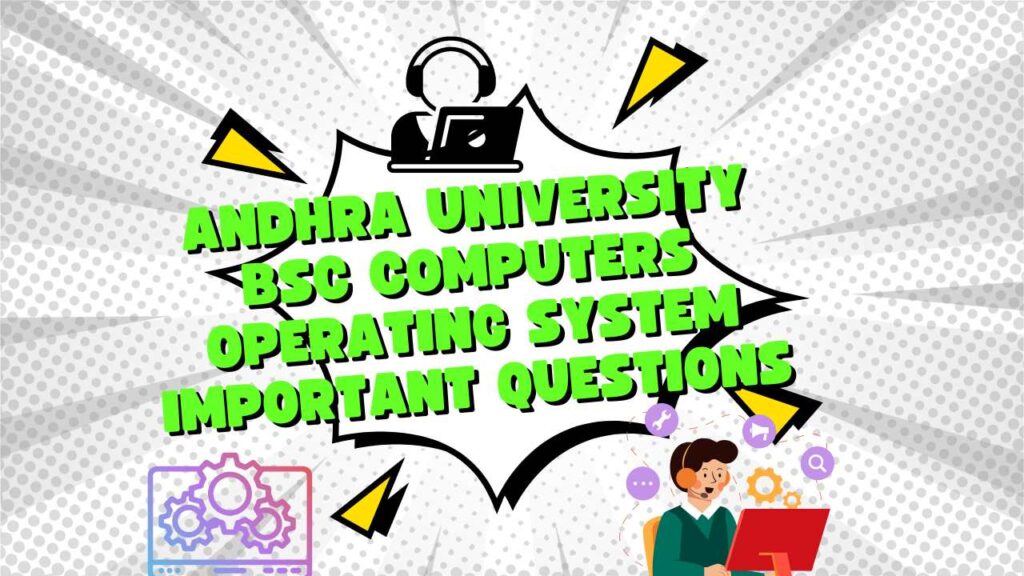Hello friends, do you want to know about Andhra University Bsc Computers Operating System Important Questions? Friends, welcome to this article, we will tell you all about the Computers Operating System Important Questions.

Friends, we have collected all the important questions mentioned in this article from the Computer Science Important Questions. Friends, all these questions are very important.
As you know Computer Science is a very interesting subject, so in this article we have shared Andhra University Bsc Computers Operating System Important Questions.
Which will help you in studying, if you memorize these Important Questions mentioned in this article, then you can understand upto 60% syllabus, so friends, Read complete list of Andhra University Bsc Computers Operating System Important Questions, till the end.
Contents
- Andhra University Bsc Computers Operating System Important Questions
- Explain the Concept of an Operating System
- Process Management
- Memory Management
- File Systems
- Concurrency and Synchronization
- Inter-Process Communication (IPC)
- Input/Output Management
- Security and Protection Mechanisms
- Distributed Operating Systems
- Real-Time Operating Systems (RTOS)
- Case Studies
- Recent Trends in Operating Systems
- Virtualization
- Kernel Modules and Extensions
- Operating System Utilities and Tools:
Andhra University Bsc Computers Operating System Important Questions

Explain the Concept of an Operating System
Define an operating system and discuss its main functions.
Describe the evolution of operating systems from simple batch systems to modern multi-user systems.
Process Management
What is a process in the context of operating systems? Discuss the process life cycle.
Explain the differences between process and thread.
Describe the various process scheduling algorithms and compare their efficiency.
Memory Management
Discuss the role of memory management in operating systems.
Explain the concepts of paging and segmentation.
Compare and contrast virtual memory with physical memory.
File Systems
Describe the file system architecture and its components.
Explain file allocation methods and directory structures.
Discuss the concept of file system security and how it is implemented in modern operating systems.
Concurrency and Synchronization
Define critical section and explain the significance of mutual exclusion in process synchronization.
Discuss various synchronization mechanisms, including semaphores, monitors, and locks.
Explain deadlocks, conditions for their occurrence, and strategies for deadlock prevention and avoidance.
Inter-Process Communication (IPC)
What is IPC and why is it important in modern operating systems?
Describe various IPC techniques like message passing, shared memory, and pipes.
Input/Output Management
Explain the I/O management and buffering architecture in operating systems.
Discuss the strategies for I/O scheduling and their importance.
Security and Protection Mechanisms
Discuss the various threats to an operating system and the mechanisms in place to protect against them.
Explain the concepts of authentication, authorization, and accounting in the context of OS security.
Distributed Operating Systems
Define a distributed operating system and explain how it differs from a centralized operating system.
Discuss the challenges associated with distributed operating systems, such as synchronization, data consistency, and fault tolerance.
Real-Time Operating Systems (RTOS)
What is an RTOS and how does it differ from a general-purpose operating system?
Discuss the characteristics of real-time tasks and the scheduling algorithms used for real-time operating systems.
Case Studies
Provide an overview of the architecture of a well-known operating system, such as UNIX, Linux, or Windows.
Discuss the unique features and design principles of the chosen operating system.
Recent Trends in Operating Systems
Discuss the impact of cloud computing on operating system design.
Explain the concept of mobile operating systems and their unique challenges.
Virtualization
What is virtualization in the context of operating systems?
Discuss the types of virtualization and their benefits.
Kernel Modules and Extensions
Explain the role of kernel modules in extending the functionality of an operating system.
Discuss the concept of loadable kernel modules in Linux.
Operating System Utilities and Tools:
Describe common operating system utilities and their uses.
Explain the importance of system administration tools for managing an operating system.
Related Posts
BSC Computer Science Interview Questions and Answers pdf
The above list covers the important questions that may be important for computer exam. By preparing well for these questions, students can cover a large part of their syllabus and perform better in the exam.
We hope that with the help of this article you have got information about Andhra University Bsc Computers Operating System Important Questions.
Friends, how did you like this post, please tell us in the comment section and if you have any questions, feel free to ask us in the Comment Box. If you find this post useful, please share it with others.